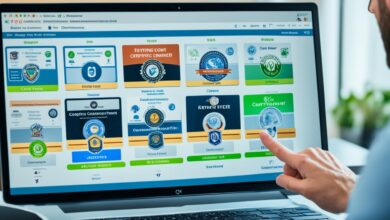Industry Knowledge: Key to Your Success – Mindsterk

Industry knowledge is a valuable asset that can propel professionals to new heights of success. Whether you’re a business owner, job seeker, or employee, having expertise in your field is essential for making informed decisions, gaining a competitive edge, and fostering growth. A deep understanding of industry dynamics, specialized skills, and market insight can set you apart from the crowd and open doors to new opportunities.
But how can you enhance your industry knowledge and stay ahead in today’s fast-paced business landscape? In this article, we’ll explore expert tips that can help you level up your industry knowledge, establish yourself as an authority, and unleash your full potential.
The Importance of Industry Knowledge:
Industry knowledge plays a pivotal role in achieving a competitive advantage and driving business growth. To stay ahead of the curve, businesses must prioritize staying updated with the latest news and trends in their respective industries. This requires continuous investment in industry education and research to gain a deep understanding of industry dynamics, including the size of the market, range of products and services offered, target customers, pricing strategies, financial aspects, recruitment processes, technological advancements, and more.
Industry knowledge provides businesses with a solid foundation to make informed decisions and navigate the complexities of their specific industry. By staying updated on industry dynamics, businesses can identify opportunities, anticipate challenges, and adapt their strategies accordingly. It allows them to assess the competitive landscape and position themselves effectively in the market.
“Success in today’s fast-paced business environment depends on having industry knowledge that goes beyond general business acumen. It’s about having a deep understanding of the factors that drive your industry, identifying unique market dynamics, and leveraging that knowledge to gain a competitive edge.”
Investing in industry education and research is crucial for businesses striving for long-term success. The knowledge and insights gained through industry-specific training programs, conferences, workshops, and seminars enable businesses to make well-informed decisions that align with industry trends and customer demands. It also paves the way for innovation and helps businesses stay ahead of the competition.
Benefits of Industry Knowledge
By acquiring and effectively utilizing industry knowledge, businesses can gain several advantages:
- Competitive Advantage: Industry knowledge provides businesses with a competitive edge by enabling them to differentiate themselves, develop unique selling propositions, and identify untapped market opportunities.
- Business Growth: A deep understanding of industry dynamics allows businesses to identify growth areas, develop targeted strategies, and effectively capitalize on emerging trends and customer demands.
- Industry Education: Investment in industry education and research equips businesses with the specialized skills and knowledge required to navigate the complexities of their industry and make informed decisions to drive success.
- Industry Dynamics: Staying updated with industry dynamics helps businesses anticipate changes, adapt their strategies accordingly, and proactively address challenges, thereby minimizing risks.
Overall, industry knowledge is a key driver of success in the business world. It enables businesses to make strategic decisions, foster growth, and establish themselves as leaders in their respective industries.
Tips to Increase Industry Knowledge:
Improving industry knowledge is essential to stay informed and thrive in a competitive marketplace. Here are some effective strategies to enhance your expertise:
Networking
Building connections with industry stakeholders and like-minded professionals can provide invaluable insights. Attend business functions, events, and conferences to meet industry experts. Engaging in professional discussions on social media platforms can also expand your network and offer diverse perspectives.
Industry Publications
Keep yourself updated with the latest industry trends and developments by reading industry publications, magazines, and journals. These sources provide in-depth analysis, case studies, and expert opinions, enabling you to gain valuable insights into your field.
Mentorship
Seeking guidance from experienced professionals in your industry can significantly accelerate your learning process. A mentor can offer personalized advice, share their expertise, and help you navigate challenges specific to your field. Their wisdom and insights can propel your career forward.
Online Research
The internet is a treasure trove of information that can contribute to your industry knowledge. Conduct thorough online research, exploring reputable websites, industry forums, and educational resources. Stay updated with industry news, emerging technologies, and market trends.
Refresher Courses
Continuing education plays a crucial role in expanding your industry knowledge. Consider enrolling in refresher courses or workshops that offer specialized training in your field. These courses can equip you with the latest skills, tools, and strategies, ensuring you stay relevant and competitive.
Finding a Niche
By focusing on a specific niche within your industry, you can establish yourself as an expert in that area. Identify an underserved segment or an emerging field and invest your time in gaining in-depth knowledge and expertise. This specialization can set you apart from others and open new opportunities.
“Investing in yourself and continuously expanding your industry knowledge is crucial for career growth and professional success.”
By implementing these tips, you can expand your industry knowledge, gain a competitive edge, and position yourself as a respected professional in your field.
Importance of Industry Knowledge to Business:
Industry knowledge plays a crucial role in driving business growth and providing a competitive advantage. By staying informed about industry trends, businesses can adapt their strategies to capitalize on new opportunities, stay ahead of competitors, and foster innovation. Let’s explore how industry knowledge impacts various aspects of a business.
Business Growth
Having a deep understanding of the industry landscape is vital for achieving sustainable business growth. By continuously acquiring industry knowledge, businesses can identify emerging trends and market shifts, allowing them to make informed decisions that align with customer needs and preferences.
Competitive Advantage
Industry knowledge provides businesses with a competitive edge by enabling them to differentiate themselves from rivals. By staying informed about industry best practices, market dynamics, and customer behaviour, businesses can develop unique strategies, products, and services that attract and retain customers.
Compliance with Regulations
Complying with industry regulations is crucial to avoid potential legal and financial consequences. Industry knowledge helps businesses stay up to date with changing regulations, ensuring that their operations remain in compliance and minimizing the risk of penalties or reputational damage.
Addressing Security Issues
In today’s digital age, businesses face various security threats related to the handling of sensitive data. Industry knowledge enables businesses to implement robust security measures, safeguard customer information, prevent data breaches, and protect their reputation.
“Industry knowledge empowers businesses to make informed decisions, adapt to market changes, and navigate industry challenges effectively.”
Promoting Continuous Improvement
Industry knowledge fosters a culture of continuous improvement within businesses. By staying informed about industry advancements, businesses can identify areas for improvement, implement innovative solutions, and enhance their operations, ultimately driving efficiency and effectiveness.
Building Industry Networks
Industry knowledge provides opportunities for businesses to connect with like-minded professionals, build valuable relationships, and expand their network. Engaging in industry events, conferences, and forums allows businesses to collaborate, learn from industry experts, and explore potential partnerships.
By prioritizing industry knowledge, businesses can strengthen their position in the market, identify growth opportunities, mitigate risks, and maintain a competitive advantage in an ever-evolving business landscape.
Levels of Industry Expertise:
When it comes to industry knowledge competency, the National Research Council of Canada has categorized it into five distinct levels, each representing a different level of expertise and understanding in the field.
The first level is the foundational level, where individuals acquire a basic understanding of the industry and its key concepts. At this stage, industry professionals are developing their foundational skills and gaining exposure to industry dynamics.
Moving up to the intermediate level, individuals have developed a deeper understanding of the industry and its various components. They have gained more experience and possess a broader knowledge base, allowing them to navigate industry challenges more effectively.
The seasoned level is where professionals have accumulated significant professional experience and have honed their skills to a higher level. They have a comprehensive understanding of industry trends, dynamics, and best practices, enabling them to tackle complex industry challenges with confidence.
At the advanced level, individuals have reached a point where their industry expertise is highly valuable. They possess specialized skills and knowledge that set them apart from others, making them sought-after within their respective industries.
Finally, the mastery level represents the pinnacle of industry expertise. Professionals at this level are considered thought leaders and have a deep understanding of industry trends, emerging technologies, and market insights. They are recognized as true masters in their fields.
Understanding these different levels of industry expertise is essential for individuals who wish to progress in their careers and become industry leaders.
| Level | Description |
|---|---|
| Foundational | Basic understanding of the industry and its key concepts |
| Intermediate | A deeper understanding of industry dynamics and challenges |
| Seasoned | Significant professional experience and comprehensive knowledge |
| Advanced | Specialized skills and expertise that set professionals apart |
| Mastery | Recognized as thought leaders and masters in their field |
Conclusion:
Becoming an industry expert requires continuous learning and networking with industry leaders. Building expertise involves sharing knowledge and insights, staying updated with industry developments, and engaging as a leader. It’s also important to find mentors and gain real-world industry experience.
Thought leadership is crucial in establishing oneself as an expert. By showcasing trust, authority, and a genuine passion for the industry, individuals can position themselves as industry experts. They can achieve this by actively participating in online communities, publishing articles in industry publications, and appearing as guests on podcasts.
FAQ
What is industry knowledge?
Industry knowledge refers to the comprehensive understanding of trends, processes, and best practices within a specific industry. It encompasses insights into market dynamics, technological advancements, regulatory changes, and competitive landscapes.
Why is industry knowledge important?
Industry knowledge is crucial as it helps businesses stay competitive, make informed decisions, and identify growth opportunities. It allows professionals to understand market trends, anticipate changes, and develop effective strategies.
How can I stay updated with the latest industry knowledge?
You can stay updated by subscribing to industry publications, attending webinars and conferences, participating in professional networks, and following key influencers and organizations in your field.
What are some reliable sources of industry knowledge?
Reliable sources include industry-specific journals, reputable news outlets, trade associations, professional organizations, government reports, and academic research papers.
How can industry knowledge benefit my career?
Having in-depth industry knowledge can enhance your credibility, improve your decision-making skills, and make you more valuable to employers. It can also open up new career opportunities and help you advance in your field.
How do companies use industry knowledge?
Companies use industry knowledge to develop competitive strategies, innovate products and services, improve operational efficiency, and identify market opportunities. It also helps in understanding customer needs and staying ahead of competitors.
Can industry knowledge vary between different sectors?
Yes, industry knowledge can vary significantly between different sectors. Each industry has unique trends, challenges, regulatory environments, and technological advancements that require specialized understanding.
How often should I update my industry knowledge?
It is important to continuously update your industry knowledge as markets and technologies evolve rapidly. Regularly consuming relevant content, attending industry events, and networking with peers can help you stay current.






